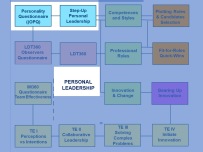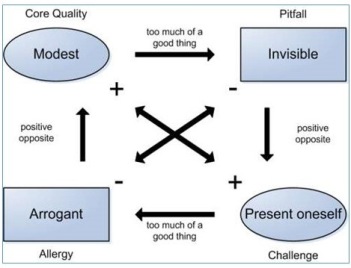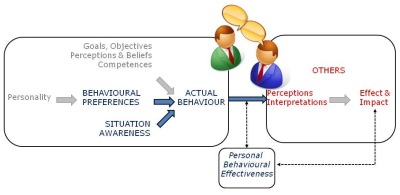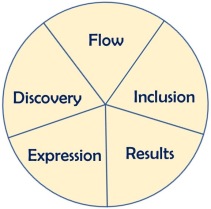THE STEP-UP PERSONAL LEADERSHIP PROGRAM
This Personal Leadership Program will help you to become ‘Master of Your Own Destiny’ and accelerate your personal development.
You will discover what type of activities really fire you up, how you can more effectively interact with the people around you and how you will be able to consciously develop yourself.
A certified reviewer will deliver to you your personal reports and will be your coach during the whole program.
You will be the owner of the reports and they will not be revealed to any other person except yourself, without your explicitly expressed consent.
If you are interested to know more about this Step-Up Personal Leadership Program Please contact us by filling the form below.
Filling a personality questionnaire
As soon as we have agreed that you will participate, LDpe will send you an invitation for filling the OPQ Personality Questionnaire.
As soon as you have completed this questionnaire, LDpe will process the results, put them in the Leadership Development Toolbox, and produce the reports that you will work with during the program.
Next, we will contact you and arrange for a personal review appointment (or book you on a review workshop).
During the review we will work through your results, explain the theories, models and concepts and answer any of your questions.
The individual program will include at least two review moments.
Learn about your Core Qualities:
the potential qualities and possible pitfalls of your behaviour
the potential qualities and possible pitfalls of your behaviour
After having studied the OPQ-profile, the outcome of your answers to the personality questionnaire, we will introduce Daniel Ofman’s Core Quality concept, an easy way of learning about your personal behavioural effectiveness.
Each individual has core qualities as a consequence of his behavioural preferences. Often, these core qualities are hardly visible to us ourselves. They come so naturally that we really don’t register them as special traits.
Yet, knowing your core qualities offers great insight into your pitfalls, challenges and allergies as well. Daniel Ofman’s Core Qualities Quadrant Methodology, Daniel Ofman helps us to recognize them.
This of course is highly valuable when you interact with other people.
When you understand the core quadrant of your core quality, it is much clearer why you respond to others the way you do. Each Core Quality Quadrant is comprised of 4 aspects:
the Core Quality
A core quality is a specific strength, something you are really good at, or for which you are often praised by others. To you, nothing special though: you believe anyone can do it. It is an inherent quality that can either be suppressed or developed.
For example: decisiveness, considerateness, carefulness, courage, orderliness and flexibility).
the Pitfall
A pitfall is ‘too much of a good thing’. The positive aspect of a core quality is over the top, turning your strength into a weakness.
For example: helpful becomes meddling; careful becomes fussy; flexible becomes capricious.
On the other hand, if the pitfall is clearly visible, you can often recognize someone’s underlying core quality because of that specific pitfall.
For example: someone who acts inflexible may have decisiveness as a core quality. Someone with an unyielding attitude may be a go-getter at the core.
the Challenge
A challenge is the positive opposite of a pitfall. Having identified the negative, transformed behavior (the pitfall), you can start looking for the challenge.
For example: in a nagging person, the positive opposite (the challenge) is patience (the core quality is decisiveness).
And: in a capricious person, the challenge is orderly behaviour (the core quality is flexibility).
The core quality and the challenge are complementary qualities. The objective is to strike a balance between the two. If the challenge is underdeveloped, the core quality must be improved to find the balance.
For example: It is not necessary to become less decisive, but to develop more patience, resulting in a patient decisiveness without nagging.
Or: find a balance between flexibility and orderliness.
the Allergy
The core qualities can also be used to identify potential conflicts with the people around you. People tend to be ‘allergic’ to too much of their own challenge in other people. The allergy is ‘too much of a good thing’ of the challenge, as well as the negative opposite of the core quality.
For example: the negative opposite of the core quality decisiveness is passiveness. Too much patience may also degenerate into passiveness. The more people are confronted with their own allergy, the greater the risk that they resolve to their own pitfall.
For example the decisive individual starts nagging in response to too much passiveness in another person.
In the Qualities and Pitfalls report we will analyse the potential qualities and possible pitfalls of the behavioural traits we have measured with the OPQ questionnaire.
Become aware of 'Conversational Intelligence' and the conditions for Personal Behavioural Effectiveness
The inventory from the personality questionnaire helps you to become aware of your behavioural preferences. Although it is very helpful for you to understand what preferences lead you to a certain behaviour, the results of your behaviour lies in the effects of it and in the impact it has on others. For leaders this is even more important, since the key issue of leadership is to achieve results through others.
Read more about the Report Conscious Effectful Interaction Competences under Awareness and Reflection: Personal Behavioural Effectiveness
Your development journey starts with identifying your Motivational Flames
What is it that really fires you up, triggers your motivation, inspires you, energises your actions, and ultimately leads you to success?
In her recent publication ‘Find Your Flame, Why Motivation Matters More than Talent’, Sophie Bennett calls it Your Motivational Flames.
By understanding what lies behind the triggers of motivation in our daily lives and the pivotal moments that precede them you will start to see just how important they are. It is even possible to engineer motivational trigger moments more often for yourself and for others. You can only do that when you understand the driving forces that set them off. When you can do that we can change the future for your team members, your company and yourself.
In the step-up personal development program, we will help you to identify your very personal pattern of motivational flames and how you can nurture them and grow them.
Develop your CEO-brain and Become Your Best Self
The key to your self-development lies in your executive brain, the part of your brains that is busy with your ability to adopt to changes, making plans, learn from feedback, outside-the-box thinking, developing a vision, making complex decisions, pro-social behaviour, feeling motivated and the ability to control your emotions and suppress ineffective behaviour. The executive brain, also named the CEO-brain, is located in the prefrontal cortex.
Professor Margriet Sitskoorn’s publication ‘Train Your CEO Brain and Become Your Best Self’ explains how you can use the plasticity of your brain to develop yourself and she describes the executive competences that govern your actions.
In the step-up personal development program we will make an inventory of the strengths of your executive competences and describe the development scenario’s how you will be able to grow them.
LDpe’s Leadership Development Toolbox (LDT):
A framework for your personal development
A framework for your personal development
The Leadership Development Toolbox (LDT) has been developed as a key instrument for the personal leadership development process. The purpose of the LDT is to provide you with a systematic means for self–reflection and self-development within a coherent framework.
It has been used by more than 3000 leaders and professionals in 25 different countries and is kept up-to-date with the newest insights and developments. The LDT-reports have proven to be excellent means for deeper self–reflection on personal behavioural effectiveness and development of the individual style portfolio.
Especially the simulation model helps you to identify the quick-wins and development options that will help you to accelerate your growth.









